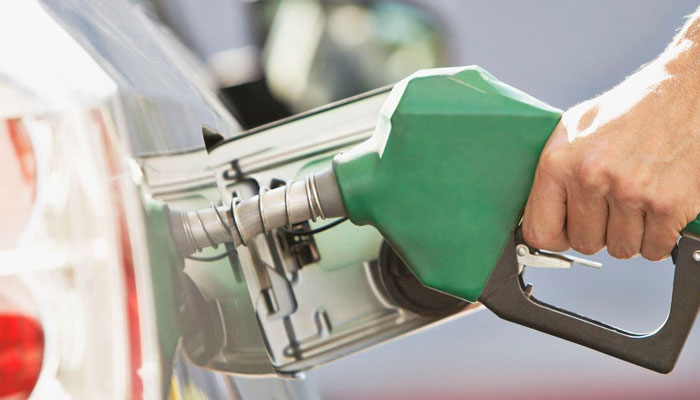Bitter pill of Rs20 rise in petrol-diesel prices under consideration
This one-time increase will still not be equal to a withdrawal of the entire subsidy, which in the case of diesel is almost Rs50 per litre
ISLAMABAD: The Shehbaz Sharif government is considering swallowing the bitter pill of increasing the petrol and diesel prices by Rs20 per litre to partially alleviate the extremely-damaging impact on the country's economy of the huge subsidy that was given by the Imran Khan government at the end of its tenure. This one-time increase, despite being huge, will still not be equal to a withdrawal of the entire subsidy, which in the case of diesel is almost Rs50 per litre.
Within days of his appointment as prime minister, Shehbaz Sharif was advised by the concerned authorities to increase the price of petrol by Rs21 per litre and diesel by Rs50 per litre. However, he decided not to raise the prices because of political considerations.
An informed government source, involved in the discussions, said that there is no choice but to increase the oil prices. "We will have to withdraw the subsidy on petrol products,” the source said.
The proposed increase, which will be announced once Prime Minister Shehbaz Sharif takes the decision, will not end the entire subsidy. In the next few months, the price of diesel will be increased to match what the product actually costs the government.
If international oil prices do not decrease, a rise of Rs20 per litre in the price of diesel would mean the government would still be paying Rs30 from its pocket for every litre of diesel being sold. To withdraw the subsidy on diesel totally, the government would have to further increase its price in the next few months.
Shahid Khaqan Abbasi and Miftah Ismail are primarily working on petroleum price options. Both have confirmed to this correspondent that no government and no country could afford what has been done by the Imran Khan government to keep the oil prices low. They said that the cost of the subsidy on petroleum products is so huge that it is more than the civilian government's budget and defence allocations.
Much, however, depends on how the government's talks with the IMF proceed. It is expected that the oil price rise will be announced after initial discussions with the Fund. Miftah Ismail, who has been appointed as the PM’s adviser on finance, is leaving for Washington to join the IMF talks. Governor State Bank Raza Baqir is already in Washington for the IMF talks.
According to former prime minister Shahid Khaqan Abbasi, petrol costs the government Rs171 per litre whereas it is sold at around Rs150 per litre. Diesel costs the government around Rs196 per litre but is sold at Rs144 per litre.
Abbasi said that as per the commitment of the Imran Khan government with the IMF, the price of petrol per litre needs to be Rs235 whereas the government is bound to increase the diesel price to Rs264 per litre. What the last government had agreed with the IMF was the cost of petrol and diesel plus a levy of Rs30 per litre at least.
Abbasi was expected to join the Shehbaz Sharif cabinet as minister for petroleum and energy. However, he did not take oath on Tuesday. When asked, Abbasi said that he would not join the cabinet but would possibly be associated with a task force on energy. He said that he would help the government and the concerned ministers without holding any ministerial portfolio.
-
 Is Elon Musk Set To Become First Trillionaire In 2026? Market Odds Explained
Is Elon Musk Set To Become First Trillionaire In 2026? Market Odds Explained -
 Prince Harry’s Protective Stance On Meghan Markle Sparked Rift With William, Charles
Prince Harry’s Protective Stance On Meghan Markle Sparked Rift With William, Charles -
 How BTS Push Through Performances As They Gear For 2026 Comeback
How BTS Push Through Performances As They Gear For 2026 Comeback -
 AI Copyright Battle: ByteDance To Curb Seedance 2.0 Amid Disney Lawsuit Warning
AI Copyright Battle: ByteDance To Curb Seedance 2.0 Amid Disney Lawsuit Warning -
 Savannah Guthrie In Tears As She Makes Desperate Plea To Mom's Kidnappers
Savannah Guthrie In Tears As She Makes Desperate Plea To Mom's Kidnappers -
 Canada’s Defence Industrial Strategy Targets 125,000 Jobs And Export Growth
Canada’s Defence Industrial Strategy Targets 125,000 Jobs And Export Growth -
 Tre Johnson, Former NFL Guard And Teacher, Passes Away At 54
Tre Johnson, Former NFL Guard And Teacher, Passes Away At 54 -
 Jerome Tang Calls Out Team After Embarrassing Home Defeat
Jerome Tang Calls Out Team After Embarrassing Home Defeat -
 Cynthia Erivo Addresses Bizarre Rumour About Her Relationship With Ariana Grande
Cynthia Erivo Addresses Bizarre Rumour About Her Relationship With Ariana Grande -
 Prince Harry, Meghan Markle Spotted Cosying Up At NBA All-Star Game
Prince Harry, Meghan Markle Spotted Cosying Up At NBA All-Star Game -
 Lady Gaga Explains How Fibromyalgia Lets Her 'connect With People Who Have It'
Lady Gaga Explains How Fibromyalgia Lets Her 'connect With People Who Have It' -
 Metro Detroit Weather Forecast: Is The Polar Vortex Coming Back?
Metro Detroit Weather Forecast: Is The Polar Vortex Coming Back? -
 Daniel Radcliffe Reveals Surprising Way Fatherhood Changed Him
Daniel Radcliffe Reveals Surprising Way Fatherhood Changed Him -
 ‘Disgraced’ Andrew At Risk Of Breaking Point As Epstein Scandal Continues
‘Disgraced’ Andrew At Risk Of Breaking Point As Epstein Scandal Continues -
 Alan Cumming Shares Plans With 2026 Bafta Film Awards
Alan Cumming Shares Plans With 2026 Bafta Film Awards -
 OpenClaw Founder Peter Steinberger Hired By OpenAI As AI Agent Race Heats Up
OpenClaw Founder Peter Steinberger Hired By OpenAI As AI Agent Race Heats Up




